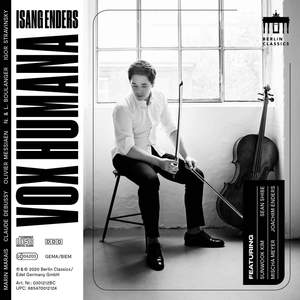With his carefully crafted concept album entitled Vox Humana cellist Isang Enders presents a study in sound and the portrayal of a musical network of contacts. For his third release on the Berlin Classics label he has painstakingly chosen French works from four centuries and approached each of them in a very individual manner, simply listening, but of perceiving. Isang Enders sees Claude Debussy as the starting point for his approach. "The first time I played Debussy, my teacher at the time told me: 'use a lot of bow, minimum pressure, lots of air'. Yet Debussy gives precise instructions above each note as to how to play it. Creating one's own individual interpretation within such strict lines has to be based on timing and nuance. You have to open up your wardrobe, so to speak, seek out every colour and structure available. It's a laborious process." From Debussy and his nuances, Isang Enders then casts his gaze into the past and into the future. Isang Enders speaks of Baroque and Impressionist legato slurs, of the aesthetics of precision, of nuance and contrasting structures, thereby creating a huge arc between various eras and gathering all of the works closer together, while allowing them each individually to expand their richness of detail. His musical partners on Vox Humana are also his personal companions: he knows pianist Sunwook Kim, Scottish guitarist Sean Shibe and his cello colleague Mischa Meyer through his active concert schedule in all parts of the world, from his student days or in his position as leader of the cello section with the Saxon Staatskapelle of Dresden, which he achieved at the age of 20. He first met the famous theremin player Carolina Eyck, who tours the world with her special instrument, in a youth orchestra and last but not least, his father is featured on the album too, playing harmonium and organ.



